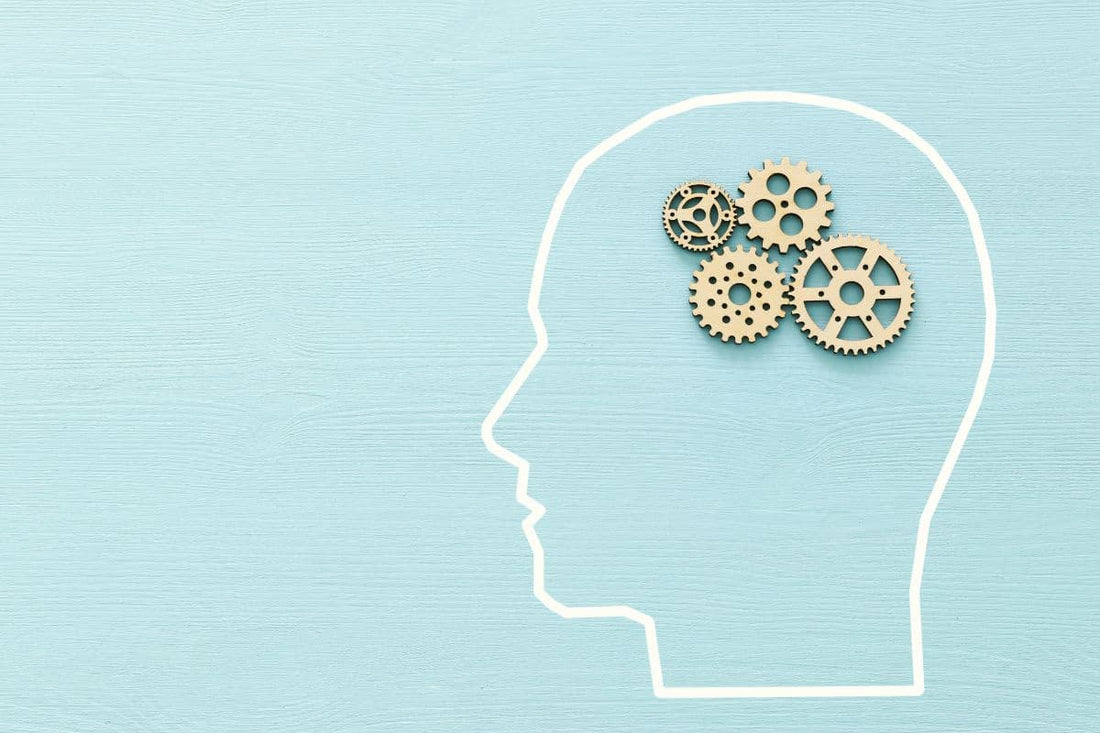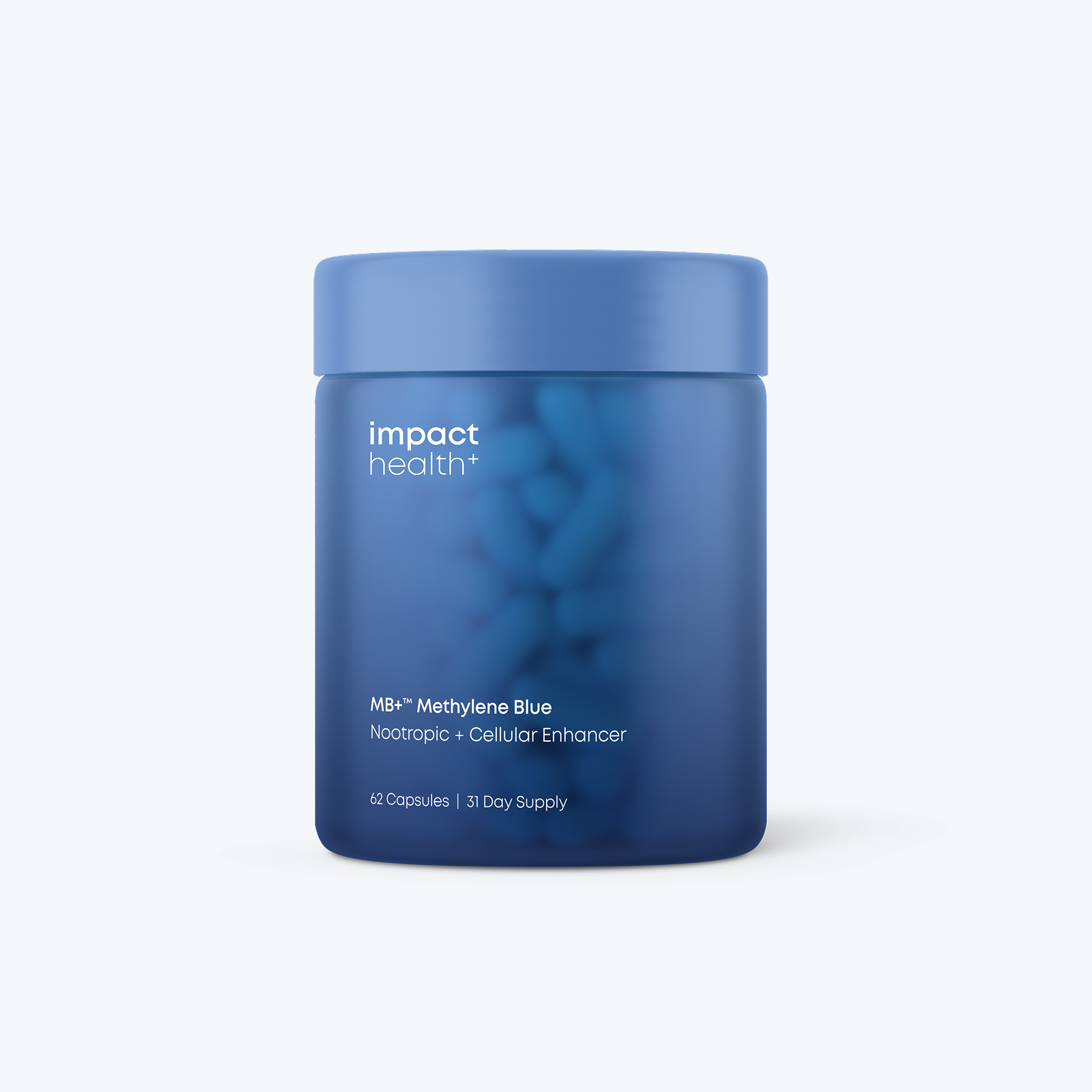
Methylene Blue for ADHD: A New Approach in 2025
Attention-Deficit/Hyperactivity Disorder (ADHD) is one of the most commonly diagnosed neurodevelopmental disorders worldwide. Characterized by persistent symptoms of inattention, impulsivity, and hyperactivity, ADHD can significantly disrupt academic performance, workplace productivity, emotional regulation, and overall quality of life.
Conventional treatments such as Adderall (amphetamine salts) and Ritalin (methylphenidate) have helped many individuals manage their symptoms effectively, however these interventions often come with side effects such as sleep disturbances, appetite suppression, mood swings, and in some cases, dependency and tolerance. As a result, both patients and practitioners are increasingly looking toward complementary and integrative strategies that support brain function without compromising long-term health.
This growing curiosity has placed a spotlight on nutraceuticals, nootropics, and mitochondrial support compounds such as methylene blue. Once relegated to niche scientific discussions, methylene blue is now being investigated for its impact on cognition, focus, memory consolidation, and even neurotransmitter modulation, all of which are highly relevant in the context of ADHD.
In this article, we’ll dive deep into how methylene blue works in the brain, how it compares to other well-known ADHD supplements, and what science currently tells us about its potential as part of an ADHD-supportive protocol. From mechanism of action to practical dosing, this article is your roadmap to understanding how mitochondrial enhancement and redox optimization can change the way we approach ADHD.
Whether you're a clinician exploring cutting-edge tools for cognitive support or an adult with ADHD seeking clarity amidst conflicting advice, this article brings precision, science, and strategy to the forefront.
Summary
Methylene blue shows potential as a supplement to support cognitive function and manage ADHD symptoms by enhancing mitochondrial activity and modulating neurotransmitters such as dopamine. Supplements such as omega-3 fatty acids, magnesium, zinc, and iron have been found to improve focus and attention by addressing common nutritional deficiencies linked to ADHD. Natural approaches including lifestyle changes, sleep optimization, and selective over-the-counter options like caffeine and L-theanine also play a key role in reducing symptoms. Understanding dopamine’s role and managing factors like dopamine crashes can further support ADHD management, highlighting the importance of combining supplements with evidence-based lifestyle strategies.
Table of Contents
Does Methylene Blue Help Mitochondria?
What Supplements Are Good for ADHD?
Does Methylene Blue Help ADHD?
Does Methylene Blue Raise Dopamine?
How Can I Reduce ADHD Symptoms Naturally?
What Can I Take for ADHD Over the Counter?
Symptoms, Causes, and Prevalence
ADHD is a complex neurological disorder rooted in the brain’s chemistry and structure.
At its core, ADHD presents through two primary clusters of symptoms: inattention and hyperactivity/impulsivity. Individuals may struggle with sustaining focus, organizing tasks, completing projects, managing time, and resisting distractions. Others may exhibit impulsive behaviors, restlessness, or difficulty remaining still, particularly in structured environments. While some experience both symptom types, others may present predominantly with one, leading to subtypes such as inattentive, hyperactive-impulsive, or combined.
From a neurochemical perspective, dopamine and norepinephrine are central to the pathology of ADHD. These neurotransmitters regulate attention, executive function, motivation, and emotional control. In ADHD, dopaminergic signaling is often underactive, particularly in areas of the prefrontal cortex responsible for decision-making, working memory, and goal-directed behavior. Norepinephrine, which plays a critical role in alertness and response regulation shows dysregulation, contributing to symptoms of distractibility and poor impulse control.
Beyond neurotransmitters, ADHD has been linked to mitochondrial dysfunction, oxidative stress, and cortical hypoarousal, all of which are being increasingly explored in the context of alternative therapies.
While genetics play a significant role, environmental factors such as prenatal stress, early exposure to toxins, nutrient deficiencies, and chronic inflammation can influence the expression and severity of ADHD symptoms. This growing body of knowledge has opened the door to integrative, mitochondria-targeted interventions, making compounds such as methylene blue highly relevant in modern discussions about ADHD support.
What Supplements Are Good for ADHD?
When it comes to managing ADHD beyond prescription medications, targeted supplementation has become a powerful tool for improving focus, mood regulation, and overall neurological function. These supplements by addressing the underlying nutritional and biochemical imbalances that often drive attention and impulse issues.
Omega-3 fatty acids, particularly EPA (eicosapentaenoic acid) have shown the most consistent benefit in both children and adults with ADHD. Supplementing with high-EPA omega-3 improves attention span, reduces impulsivity, and supports emotional regulation. This is due to EPA’s direct role in optimizing cell membrane fluidity and neurotransmitter signaling. The Best Anti-Aging Supplements in 2025
Magnesium is another foundational mineral for ADHD support. It regulates over 300 enzymatic reactions in the body, including those responsible for neurotransmitter synthesis and function. Low magnesium levels correlate with hyperactivity, restlessness, and poor sleep, all common challenges for those with ADHD.
Iron, specifically ferritin (stored iron), is vital for dopamine production. Numerous studies have confirmed that individuals with low ferritin levels exhibit more severe ADHD symptoms, particularly inattentiveness. Supplementation improves attention and learning outcomes, especially in those with low baseline levels.
Other supplements with well-documented roles in ADHD treatment include vitamin B6, n-acetyl cysteine (NAC), rhodiola rosea, panax ginseng, and phosphatidylserine. When combined, these supplements bring measurable improvements in daily functioning and long-term cognitive resilience.
Methylene Blue
Methylene blue is a synthetic compound first developed in the late 19th century, originally used as a textile dye before quickly finding a place in medicine. It was one of the first drugs used to treat malaria and later became a critical treatment for methemoglobinemia, a condition where oxygen delivery is impaired due to dysfunctional hemoglobin. Over the past century, its medical use has expanded, with methylene blue gaining attention for its unique biochemical properties that directly support cellular and neurological health. Methylene Blue: History, Uses, and Risks
At the core of methylene blue’s function is its role as a redox agent and mitochondrial enhancer. It acts as an alternative electron carrier in the electron transport chain, bypassing dysfunctional segments of the mitochondria and enabling sustained ATP production even in stressed or energy-deficient cells. This effect is especially relevant for the brain, where mitochondria are responsible for generating the energy needed for neurotransmission, cognitive performance, and neuroplasticity.
Methylene blue also exhibits direct regulatory effects on key neurotransmitters. It modulates acetylcholine, dopamine, and serotonin systems, all of which are critically involved in focus, attention, and mood stability; three pillars of ADHD pathology.
Its dual action, both as a mitochondrial optimizer and a neuromodulator, makes methylene blue distinct from standard ADHD supplements and pharmaceuticals. Rather than overstimulating the brain and masking symptoms, methylene blue restores function from the ground up, strengthening the biological foundation for better cognitive control, memory, and emotional regulation.
Focus, Dopamine, and Neural Efficiency
Scientific research continues to validate methylene blue as one of the most compelling compounds for cognitive enhancement and neurological resilience. Unlike traditional stimulants that offer short-lived boosts in attention, methylene blue targets the foundation of cognitive performance. It increases cellular respiration in neurons, leading to heightened mental clarity, faster processing, and more stable attention regulation.
One of the most important ways methylene blue supports focus is by enhancing dopamine signaling. Dopamine is the neurotransmitter tied to attention, motivation, and reward-based learning, three cognitive functions that are often dysregulated in individuals with ADHD. Studies show that methylene blue increases dopamine synthesis and preserves dopaminergic neurons by reducing oxidative stress, one of the leading causes of neurotransmitter degradation. By protecting and enhancing these pathways, methylene blue improves executive function, reduces distractibility, and supports sustained mental performance.
Beyond dopamine, methylene blue improves overall neural efficiency by stabilizing the redox environment within brain cells. It reduces free radical buildup and oxidative damage, both of which impair cognitive function over time. Neuroimaging and memory-based studies reveal that individuals taking low doses of methylene blue demonstrate increased activity in brain regions associated with working memory, decision-making, and mental flexibility; all without the jitteriness and overstimulation common with other nootropic agents.
These effects make methylene blue an ideal compound for those seeking a deeper, more sustained improvement in focus and cognitive output, especially when brain fog, low energy, and burnout become barriers to productivity. For individuals with ADHD or attention difficulties, methylene blue offers a mitochondria-first approach to cognitive optimization that goes beyond surface-level symptom relief.
How Can I Reduce ADHD Symptoms Naturally?
While ADHD is often managed with prescription medication, a growing number of individuals are turning to natural alternatives to reduce symptoms and regain control without relying on pharmaceuticals. The foundation of this approach begins with nutrition. A diet high in processed foods, refined sugar, and artificial additives can intensify ADHD symptoms, while whole foods, rich in omega-3s, healthy fats, protein, and complex carbohydrates provide more stable energy and support neurotransmitter production.
Beyond diet, exercise is a proven tool for reducing ADHD symptoms. Regular movement, especially cardiovascular training, boosts dopamine and norepinephrine levels in the brain, improving attention, motivation, and mood. Activities such as running, swimming, martial arts, and walking can produce measurable changes in focus and hyperactivity. Pair this with consistent, high-quality sleep and you’ll tap into one of the most underutilized levers for ADHD management.
Creating distraction-free workspaces, breaking tasks into smaller steps, using visual schedules, and implementing accountability systems can dramatically improve organization and productivity. Turning off unnecessary notifications and building structured routines can also help calm the brain’s tendency to wander. When combined, these strategies create a powerful, multifaceted approach to managing ADHD naturally.
MB+™ | Methylene Blue Capsules (31 Day Supply)
Over-the-Counter Options
If you’re exploring ways to support ADHD symptoms without a prescription, the world of over-the-counter supplements offers a wide range of tools designed to enhance focus, attention, and mental clarity. While these aren’t substitutes for medical treatment, many individuals have found relief through targeted nootropics and nutrient-based interventions.
Caffeine remains the most accessible and widely used Adderall alternative. By increasing dopamine and norepinephrine activity in the brain, caffeine can improve alertness and short-term cognitive performance. Pairing caffeine with L-theanine, an amino acid commonly found in green tea, can help to smooth out the jitters to promote calmer, more sustained focus. This combination is one of the most studied natural stacks for attention and productivity.
Bacopa monnieri is another standout—an adaptogenic herb with a long history in Ayurvedic medicine. Studies show that bacopa improves memory retention, learning speed, and attention span, particularly when taken consistently over several weeks. It works in part by supporting acetylcholine levels and reducing oxidative stress in the brain.
Ginkgo biloba, known for its ability to enhance blood flow and cerebral circulation, is often used to improve cognitive performance and executive function. Some research suggests it may reduce impulsivity and improve mental processing speed, particularly in children and adults with attention challenges.
Other natural options include Rhodiola rosea, which boosts mental stamina under stress, and tyrosine, an amino acid that helps replenish dopamine during periods of cognitive demand. These ingredients work best when paired with foundational nutrients such as magnesium, zinc, omega-3s, and B-vitamins.
While over-the-counter supplements don’t carry the intensity of prescription stimulants, they also avoid the harsh side effects and dependency risks. When used consistently and intelligently, they offer a safe and effective path to better focus, attention, and mental clarity for those looking to manage ADHD symptoms naturally.
Future Outlook
Methylene blue is rapidly gaining traction as a powerful tool in the evolving landscape of ADHD support. It stands apart from traditional supplements, introducing a new layer of precision and cellular optimization to ADHD supplementation strategies.
For those navigating ADHD, the best outcomes come from a synergistic approach, combining high-quality, research-backed supplements with optimized sleep, movement, and nutrition.
As research continues to expand, methylene blue is expected to play a prominent role in neurodevelopmental and cognitive performance protocols.


